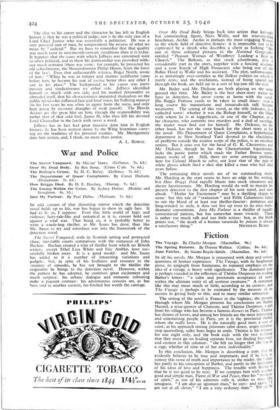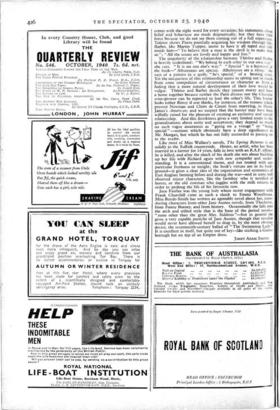Fiction
The Voyage. By Charles -Morgan. (Macmillan. 9s.)
IN all his novels, Mr. Morgan is concerned with deep and serious questions of human experience. The Voyage, with its heightened prose, its epigraph from Santayana, its repeated emphasis on the idea of a voyage, is heavy with significance. The dominant note is perhaps sounded in the reflection of Therese Despreux on reading Barbees letters : "a .calm and passionate acceptance of unitY within the ultimate unity of all sentient creatures." A statement like this may mean much or little, according to its context; and The Voyage is perhaps to be estimated by the measure of its success in giving body to this, and to many similar utterances.
The setting of the novel is France in the 'eighties; the persons through whom Mr. Morgan presents his conclusions are Barbet Hazard, a wine-grower of Charente, and The:rese Despreux, a girl from his village who has become a famous diseuse in Paris. Therese has dozens of lovers, and among her friends are the most interesting and entertaining people in Paris, yet it is the provincial Barbet whom she really loves. He is the naturally good man, a sort of saint; at his approach rioting prisoners calm down angry relatives stop quarrelling, sulky boys begin to smile. The:rese is his mistress for one night only, and the book ends with the two realising that they must go on leading separate lives, yet finding hafTiness and content in this solution: "she felt no longer that she was ill a cage, whether of time or of her own individuality." In this conclusion, Mr. Morgan is describing a state that he evidently believes to be true and important; and if he fails to convey this sense of truth and importance to the reader, the fAure lies partly in his conception of Barbet, and partly in the limitation, of his ideas of -love and happiness. The trouble with Barbet is 'that he is too good to be true. If we compare him with another good and simple man, Pierre of War and Peace, then his' modest!, of spirit," as one of his admirers calls it, strikes us more ilk, e smugness. "I am also an ignorant man," he says: and again, I
am not at all deter," "I am a very ordinary- -Yet he
comes with the right word for every occasion; his statements about belief and behaviour are made dogmatically, but they have little force because we do not see them coming out of a full experience, Tolstoy shows Pierre painfully acquiring his wisdom through life; Barbet, like Martin Tupper, seems to have it all tatied and tidy inside him—" To believe that a man is `the devil is to make him
so "; "All the senses are lovely and happy and free." '
• The singularity of the relationship between Therese and Barbet is heavily underlined: "-We belong to each other in our own way," she says. "It is no. one else's way." " Special " is a keyword of the book—" Albatrosses are special. Albatrosses are a thing," she says of a pattern in a quilt; "he's special," of a heating stove. Yet the uniqueness of this relationship seems to spring not so much from some compulsion of circumstance or character as from a feeling that a more natural development of their love would be Vulgar. Therese and Barbet decide they cannot marry and have a home together because neither the Paris diseuse nor the Charente wine-grower can be expected to lead the other's life. This barrier looks rather flimsy if one thinks, for instance, of the reasons which prevent Newman and Claire de Cintre from marrying, in Henry James's American; and we suspect that the barrier may have been wilfully raised for the pleasure of creating an exclusive and special relationship. And this finickiness gives a very limited scope to the generalisations about.unity and acceptance; they depend so much on such vague assurances as "going on a voyage" or "being special " —notions which obviously have a deep significance to Mr. Morgan, but which he has not fully succeeded in passing on to the reader.
Like most of Miss Wallace's novels, The Spring Returns is set solidly in the Suffolk countryside. Hester, an artist, who has been married to a farmer forl4years, falls in love with an R.A.F. officer; he is killedrand after the shock of his death she sets about building up her life with Richard again with new sympathy and under- standing. It is a conventional theme and not treated with any particular freshness or insight; the book's virtues are in its back- ground—it gives a clear idea of the organisation and economics of East Anglian farming before and during the war—and in some well observed minor characters, like the farmboy who is terrified of horses, or the old cowman who juggles with the milk returns in order to prolong the life of his favourite cow.
Jane Fairfax was the young lady whose secret engagement with Frank Churchill came as such a shock to Emma Woodhouse. Miss Royde-Smith has written an agreeable novel about her, intro- ducing characters from other Jane Austen novels, from ThackeraY, from Fanny Burney, and from history. - Occasionally she falls into the arch and stilted style that is the bane of the period novel- " none other than the great Mrs. Siddons "—but in general she gives a very capable pastiche of Jane Austen, though that novelist would never have allowed herself to drag in by the most obvious device, the seventeenth-century ballad of "The Swimming Lady." It is excellent in itself, but quite out of key—like sticking a Gains- borough hat on top of an Empire dress.
JANET ADAM SMITH.



























 Previous page
Previous page